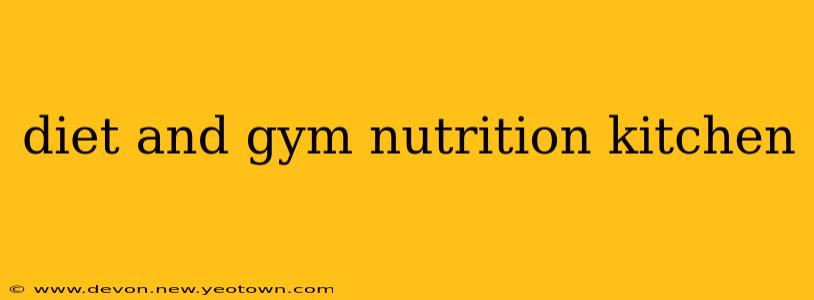Imagine this: you're diligently hitting the gym, pushing your limits, striving for that sculpted physique or peak performance. But your efforts are only half the battle. The other half? What you fuel your body with – and that starts right in your kitchen. This isn't about restrictive diets or fad trends; it's about building a sustainable, delicious, and effective nutrition plan that complements your workouts and enhances your overall well-being. This guide will take you on a journey from understanding the basics to mastering the art of preparing gym-friendly meals in your very own kitchen.
What Should I Eat Before a Workout?
This is a crucial question, and the answer depends largely on the intensity and duration of your workout. A light snack 30-60 minutes before exercise is usually ideal. Think easily digestible carbohydrates for energy and a touch of protein to prevent muscle breakdown. A banana with a small handful of almonds, a piece of whole-wheat toast with a thin layer of nut butter, or a small Greek yogurt are all excellent choices. Avoid anything too heavy or greasy that could cause digestive discomfort during your workout.
What Should I Eat After a Workout?
The post-workout meal is your opportunity for muscle recovery and replenishment. This is when your body is most receptive to nutrients. Aim for a combination of carbohydrates and protein. Carbohydrates replenish glycogen stores (your body's energy source), while protein repairs and rebuilds muscle tissue. A protein shake with some fruit, a chicken breast salad with quinoa, or a lean meat and sweet potato combination are all effective options. Timing is key here – ideally within 30-60 minutes after your workout.
What Kind of Diet Is Best for Building Muscle?
Building muscle requires a consistent caloric surplus – meaning you consume more calories than you burn. However, it's not just about how many calories you eat, but what kind. A diet rich in lean protein is paramount. Think chicken, fish, turkey, beans, lentils, and Greek yogurt. Combine this with complex carbohydrates like brown rice, quinoa, oats, and sweet potatoes for sustained energy. Don't forget healthy fats from avocados, nuts, seeds, and olive oil, which are crucial for hormone production and overall health. Remember, consistency is key – small, steady gains are more sustainable than drastic changes.
How Can I Prepare Healthy Meals in Advance?
This is where planning and preparation become your secret weapons. Meal prepping is a game-changer for busy individuals. Spend a few hours on the weekend preparing meals for the entire week. Cook large batches of grains, lean protein, and vegetables, then portion them out into individual containers. This way, you always have healthy, convenient options readily available, preventing impulsive unhealthy choices when hunger strikes.
What Are Some Easy Gym-Friendly Recipes?
Let's get practical! Here are a few simple, nutritious recipes that are perfect for gym-goers:
-
Overnight Oats: Combine rolled oats, milk (dairy or non-dairy), chia seeds, protein powder, and your favorite fruits in a jar and refrigerate overnight. A quick and easy breakfast packed with protein and fiber.
-
Chicken and Veggie Stir-Fry: Stir-fry lean chicken breast with a variety of colorful vegetables like broccoli, peppers, and carrots. Serve over brown rice or quinoa. Quick, customizable, and packed with nutrients.
-
Greek Yogurt with Berries and Nuts: A simple, high-protein snack or breakfast option. The protein from the yogurt helps with muscle recovery, while the berries and nuts provide antioxidants and healthy fats.
Are There Any Specific Supplements I Should Consider?
While a balanced diet is the foundation, some supplements can be beneficial for athletes. Protein powder can be helpful for increasing protein intake, especially if you struggle to meet your daily requirements. Creatine can boost strength and power, and omega-3 fatty acids support overall health and recovery. Always consult with a doctor or registered dietitian before starting any new supplements to ensure they are right for you and don't interfere with any existing medications. Remember, supplements are meant to complement a healthy diet, not replace it.
What Should I Avoid Eating Before or After My Workout?
Avoid heavy, fatty, or sugary foods before a workout as these can lead to digestive upset and sluggishness. Similarly, after your workout, steer clear of processed foods, sugary drinks, and excessive amounts of saturated or unhealthy fats. These hinder muscle recovery and can negate the benefits of your workout.
By understanding the principles of gym nutrition and applying these strategies in your kitchen, you'll not only enhance your fitness results but also foster a healthier and more sustainable relationship with food. Remember, consistency and a balanced approach are key to achieving your fitness goals. Your kitchen is your secret weapon – use it wisely!

